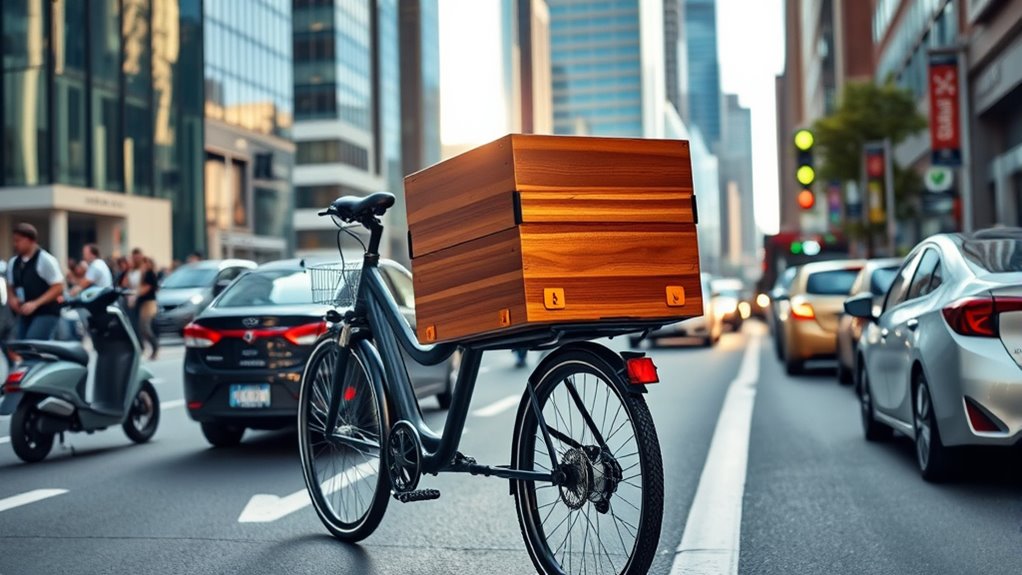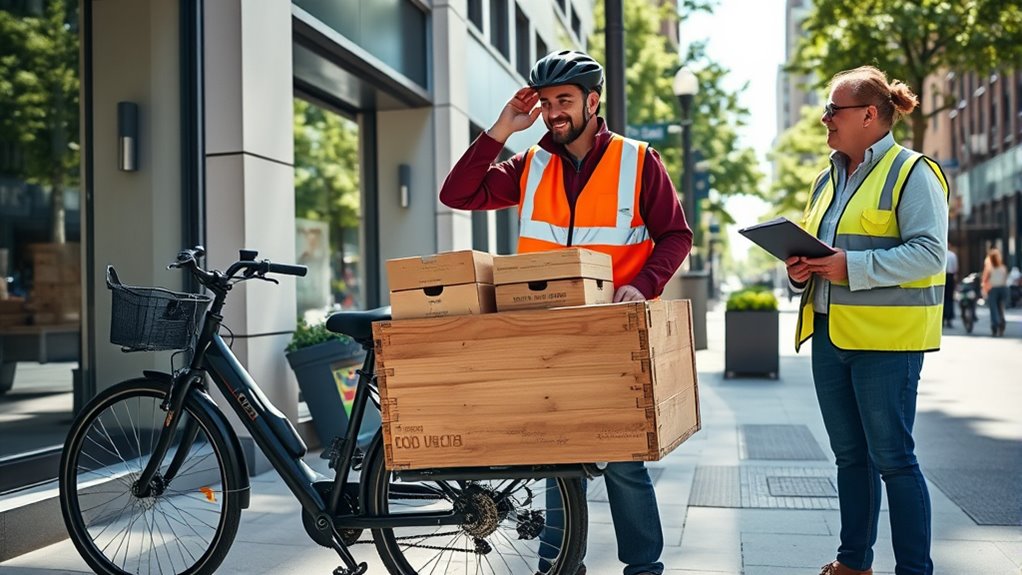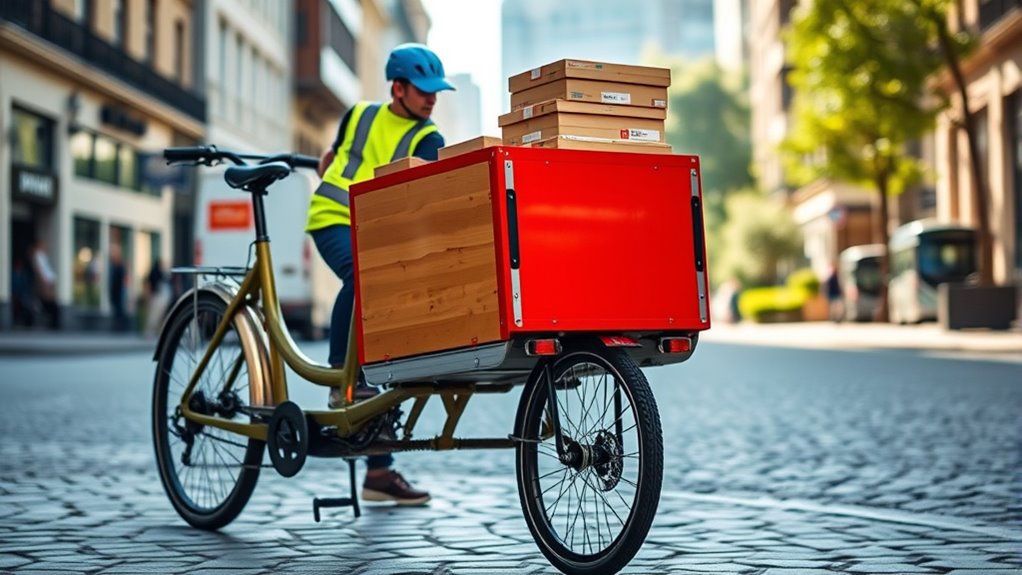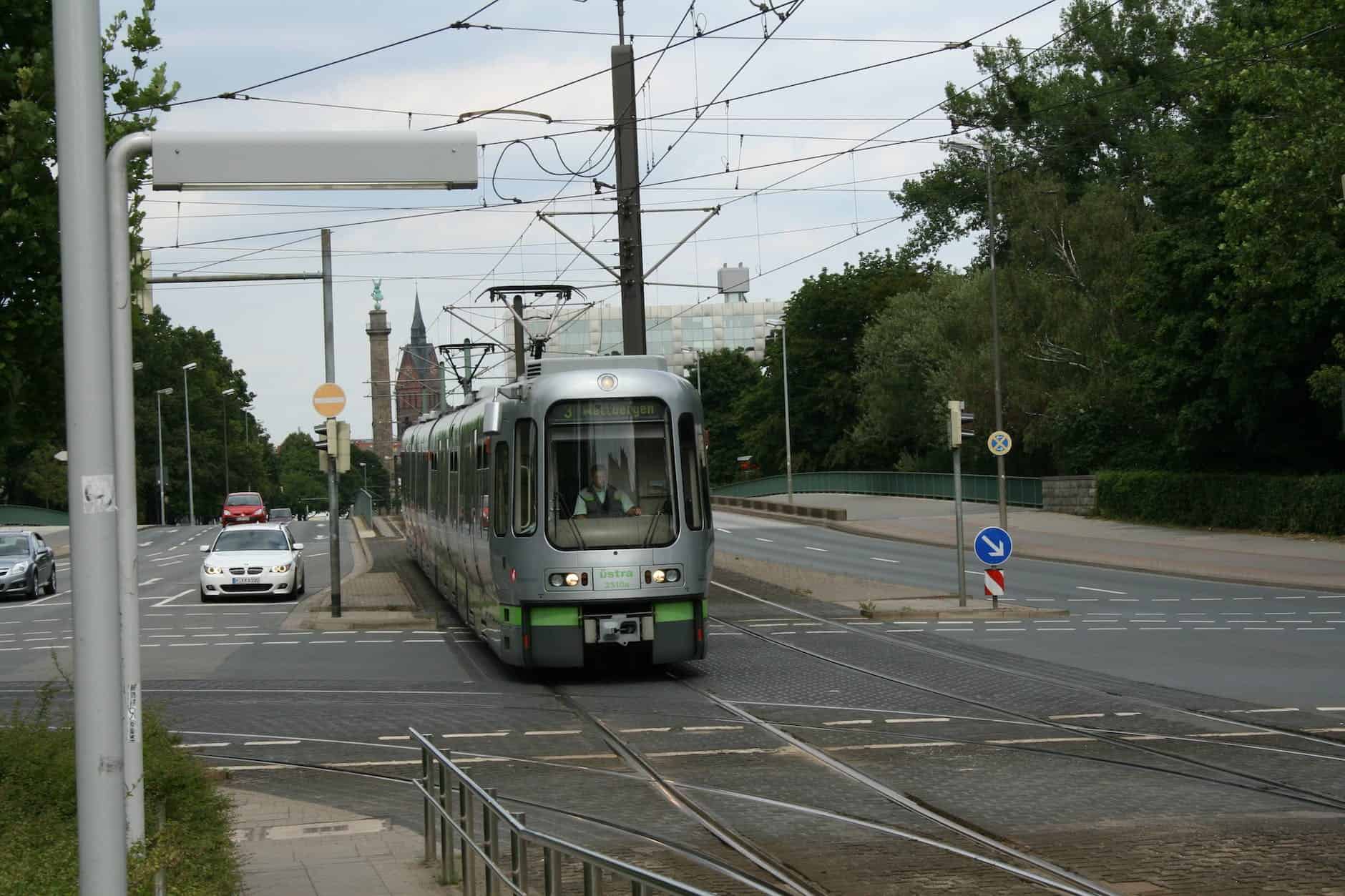Cargo bikes are transforming last-mile deliveries by providing a faster, greener, and more cost-effective option in busy urban areas. They can carry heavy loads, reduce traffic congestion, and cut emissions by up to 98%. Thanks to innovative tech and supportive policies, cargo bikes now optimize routes and streamline operations. By choosing this eco-friendly solution, you’re helping cities become cleaner and more livable—discover how these benefits can work for your delivery needs.
Key Takeaways
- Cargo bikes excel in last-mile delivery by maneuvering crowded urban streets efficiently and carrying up to 550 lbs of parcels.
- They significantly reduce emissions—up to 98%—compared to diesel vans, supporting sustainable urban logistics.
- Electric cargo bikes boost route efficiency by up to 30% and enable more deliveries per hour, increasing productivity.
- Their compact size eases parking and reduces traffic congestion, enhancing urban mobility and infrastructure use.
- Collaboration, policy support, and technological innovations facilitate widespread adoption of cargo bikes for last-mile deliveries.
Advantages of Cargo Bikes for Urban Deliveries

Cargo bikes offer several key advantages for urban deliveries. They excel in last-mile delivery, making urban logistics more efficient by maneuvering crowded streets quickly. With their ability to carry up to 550 lbs., cargo bikes handle a variety of parcels, including office supplies, with ease. Electric cargo bikes further enhance efficiency, allowing you to cover delivery routes faster—up to 30% more route-efficient than vans—saving time and resources. They perform more than twice the number of deliveries per hour, boosting productivity. Importantly, cargo bikes considerably reduce emissions, with emissions reduction of up to 98% compared to diesel vans. This makes them a vital part of sustainable transport strategies, helping you lower costs and your environmental impact simultaneously. Incorporating vetted cargo bikes ensures reliable performance and safety for urban delivery operations. Additionally, their cost-effectiveness makes them an appealing alternative for many delivery services. Utilizing environmentally friendly transportation options like cargo bikes supports companies’ efforts to meet environmental standards and improve their corporate responsibility profiles.
Environmental and Economic Benefits

Since transportation considerably impacts urban environments, switching to cargo bikes can deliver substantial environmental and economic benefits. Cargo bikes drastically reduce greenhouse gas emissions—up to 98% compared to diesel vans—improving air quality and supporting sustainable delivery. Operating costs for electric cargo bikes are about ten times lower than traditional vans, making last-mile logistics more affordable and efficient. The total ownership cost per parcel delivered by cargo bikes is roughly €0.10, compared to over €1 for diesel or electric vans, offering significant savings. These bikes help cut traffic congestion and urban freight emissions, creating healthier, cleaner cities. By adopting cargo bikes, you support eco-friendly logistics that lower costs while minimizing environmental impacts, making them a smart choice for sustainable urban delivery solutions. Incorporating efficient transportation methods in delivery operations can further optimize communication and efficiency through auditory cues and alerts. Additionally, integrating advanced navigation systems can improve route planning, reducing delivery times and enhancing overall system performance. Emphasizing environmental innovations like cargo bikes encourages cities to adopt more sustainable and innovative urban logistics solutions. Furthermore, promoting sustainable urban mobility can lead to broader environmental benefits and healthier communities.
Impact on Traffic, Parking, and Urban Infrastructure

Replacing small delivery vans with cargo bikes can substantially ease urban traffic congestion, as these bikes navigate more efficiently through crowded streets and can reduce over 50% of van traffic. Their compact size allows easy parking in tight spaces, minimizing delays and reducing urban parking shortages. To support safe and efficient last-mile delivery, infrastructure improvements like dedicated bike lanes and loading zones are essential. Cargo bikes also lessen the load on roads, decreasing wear and tear on urban infrastructure. Using electric cargo bikes further enhances delivery efficiency and sustainability. This shift promotes sustainable urban transport, reduces emissions, and noise pollution. Visualize the impact with this imagery:
| Feature | Benefit | Impact |
|---|---|---|
| Cargo bikes | Maneuverability in crowded streets | Reduces traffic congestion |
| Compact size | Easy parking | Eases parking shortages |
| Infrastructure | Dedicated lanes & zones | Improves delivery safety & speed |
| Road load | Less wear and tear | Maintains urban infrastructure |
| Electric bikes | Increased efficiency & eco-friendliness | Supports sustainable transport |
Additionally, implementing proper safety protocols for cargo bike operators can further enhance their viability for last-mile delivery. Incorporating advanced tracking systems can also improve delivery accuracy and accountability, fostering trust among consumers and businesses alike. Understanding urban planning principles is crucial for designing infrastructure that optimally supports cargo bike deployment. Moreover, adopting environmental impact assessments can help evaluate and minimize the ecological footprint of cargo bike logistics. Furthermore, considering environmental impacts ensures that the shift to cargo bikes aligns with broader sustainability goals.
Technological Innovations and Operational Optimization

Technological innovations are transforming last-mile cargo bike operations by enhancing efficiency and reliability. You can optimize operational workflows through advanced route planning software that minimizes delivery times and fuel consumption. Modular loading systems on cargo bikes streamline loading and unloading, reducing operational errors and time. Energy management technologies, such as zonal air conditioning and near-body heating, extend the bikes’ range while improving rider comfort. Smart sensors and telematics enable real-time tracking, maintenance alerts, and data-driven decisions, boosting delivery efficiency. Additionally, integrated particulate reduction technologies help keep urban air cleaner without compromising performance. These innovations collectively enable cargo bikes to operate more effectively within urban transport networks, reducing congestion and supporting sustainable last-mile delivery solutions. Moreover, understanding the Hours Today List of various beauty stores can help delivery services plan pickups and deliveries more efficiently in retail hubs.
Stakeholder Engagement and Policy Support

Engaging stakeholders is essential to expanding cargo bike use in urban delivery systems. Effective stakeholder engagement brings together urban planners, transport authorities, logistics companies, and cycling organizations to develop cyclist-friendly policies and infrastructure that support cargo bikes. Policy support like subsidies, tax incentives, and clear regulations have proven to boost cargo bike deployment in cities such as Amsterdam, Copenhagen, and New York. Multi-stakeholder partnerships help address operational challenges, including infrastructure gaps and weather impacts, enabling smoother integration into urban logistics networks. Stakeholder-driven initiatives, including pilot programs and public-private collaborations, successfully expand cargo bike usage and raise awareness among residents and businesses. Cities with proactive policies and active stakeholder involvement tend to see higher adoption rates, leading to reduced last-mile emissions and congestion. Incorporating proper infrastructure is fundamental to ensuring the safety and efficiency of cargo bike deliveries in urban environments. Additionally, fostering collaborative planning among diverse stakeholders can facilitate innovative solutions to logistical and infrastructural obstacles, further promoting sustainable urban freight practices. Building trust and communication among stakeholders can enhance coordination and accelerate the implementation of effective cargo bike policies. Moreover, integrating awareness campaigns can help inform the public and local businesses about the benefits of cargo bikes, encouraging broader acceptance and usage.
Frequently Asked Questions
What Is the Biggest Issue With Last Mile Delivery?
The biggest issue with last mile delivery is the high operational costs, which make up over half of total transportation expenses. You face challenges like urban congestion, limited parking, and delays that reduce efficiency. Conventional vehicles worsen traffic and pollution, making deliveries slower and more expensive. As e-commerce grows, these issues intensify, pushing you to find innovative solutions to cut costs, improve speed, and reduce environmental impact.
What Is the New Trend for Last Mile Delivery Services?
You’re asking about new trends in last-mile delivery services. Right now, electric cargo bikes are gaining popularity because they’re efficient, eco-friendly, and cost-effective. Cities are investing in infrastructure to support these bikes, and companies are expanding their fleets and collaborating with micro-depots. These innovations help you deliver faster, cheaper, and greener, making last-mile delivery more sustainable and adaptable for urban environments.
How to Solve Last Mile Delivery?
You want to solve last-mile delivery challenges, and cargo bikes are the answer. They cut costs, reduce congestion, and speed up deliveries by up to 51%. With their ability to navigate tight spaces and park easily, you overcome urban infrastructure hurdles. Plus, electric models make city navigation more efficient. Embracing cargo bikes not only improves delivery times but also makes your logistics more sustainable and cost-effective.
What Is the Last Mile Delivery Cargo?
You’re asking what last mile delivery cargo is. It’s the final step in delivering goods from a distribution center to the customer’s doorstep. This cargo can include parcels, food, or supplies, transported over short distances within urban areas. Efficiently managing this cargo is vital because it impacts delivery speed, costs, and environmental sustainability. Using innovative solutions like cargo bikes, you can make this process faster, cheaper, and greener.
Conclusion
Imagine weaving through bustling city streets on a cargo bike, your route clear of snarled traffic and crowded parking. By embracing this eco-friendly delivery solution, you help reduce pollution and ease urban congestion. With innovative tech guiding your way and supportive policies behind you, cargo bikes transform last-mile deliveries into a smooth, sustainable journey. Together, you’re shaping cleaner, greener cities—one pedal stroke at a time—turning urban chaos into calm, efficient flow.
















